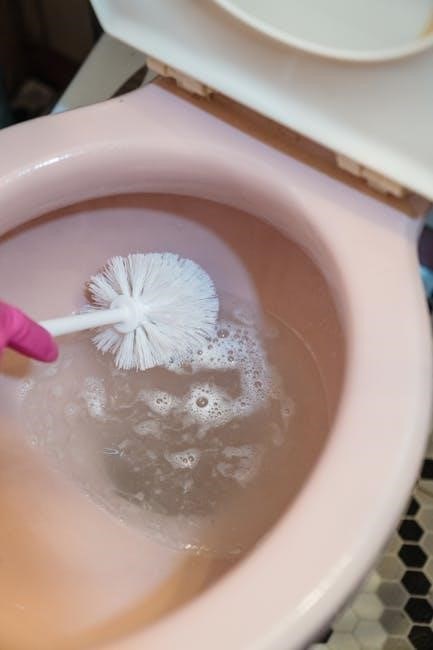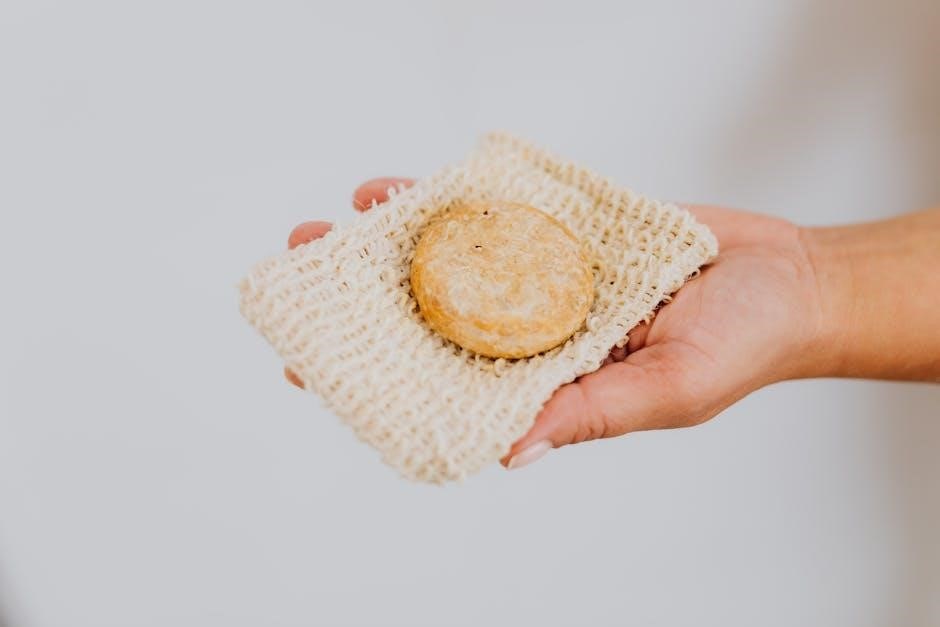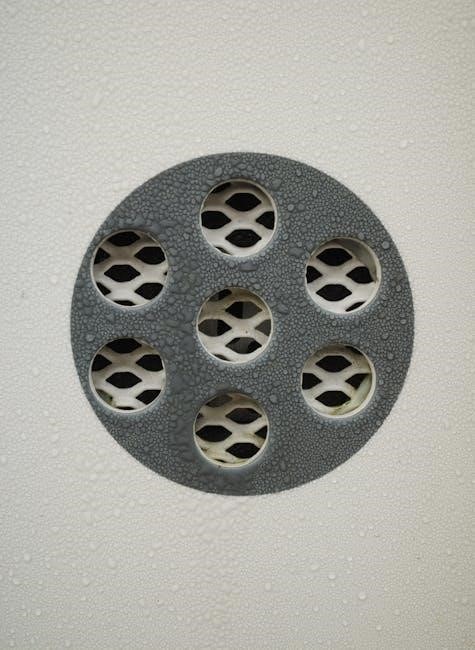Maintaining a clog-free shower drain is essential for smooth water flow and a pleasant bathroom experience. Regular cleaning prevents hair buildup, avoiding costly repairs and ensuring freshness.
Overview of Shower Drain Maintenance
Shower drain maintenance involves regular practices to prevent clogs and ensure smooth water flow. It focuses on addressing common issues like hair buildup, soap scum, and grease accumulation. By implementing simple routines, such as using strainers and flushing drains with hot water, homeowners can avoid blockages. Consistent care also reduces unpleasant odors and prevents costly plumbing repairs. Understanding the basics of drain maintenance helps create a hassle-free bathroom experience and promotes long-term plumbing health.
Why Regular Maintenance is Important
Regular shower drain maintenance is crucial for preventing clogs, reducing unpleasant odors, and ensuring smooth water flow. Over time, hair, soap scum, and grease accumulate, leading to blockages that can cause costly repairs. By addressing these issues early, homeowners can avoid backups, extend the life of their plumbing system, and maintain a clean, hygienic bathroom environment. Consistent care also prevents slow drainage and enhances overall shower functionality, making regular maintenance a vital part of home upkeep.
Preventative Measures for a Clog-Free Shower Drain
Prevent clogs by using hair catchers, regular drain cleaning, and flushing with boiling water. Avoid harsh chemicals and schedule professional inspections to maintain a smooth, clog-free system.
Using a Hair Catcher or Strainer
Installing a hair catcher or strainer is a simple yet effective way to prevent clogs. These devices trap hair and debris before they enter the drain, reducing buildup. Regularly cleaning the catcher ensures optimal performance. This method is eco-friendly and avoids the need for harsh chemicals. By stopping hair and soap scum early, it helps maintain smooth water flow and prevents costly repairs. Consistent use of a strainer is a proactive step toward a clog-free shower drain system.
Regular Cleaning of the Drain Grate
Regularly cleaning the drain grate is a straightforward step to maintain a clog-free shower drain. Remove the grate and scrub it with soap and water to eliminate trapped hair and debris. For tougher buildup, soak it in a mild detergent solution. Ensure the grate is securely replaced to catch future debris. This simple routine prevents clogs, reduces odors, and maintains smooth water flow; Consistent cleaning is a key part of effective drain maintenance.
Flushing the Drain with Boiling Water
Flushing your shower drain with boiling water is an effective way to maintain a clog-free flow. Pour boiling water down the drain to dissolve grease, soap scum, and hair buildup. This simple method breaks down debris without harsh chemicals. For tougher clogs, let the water sit for a few minutes before rinsing. Repeat weekly to keep your drain clear and functioning smoothly. It’s a natural, cost-effective solution for routine maintenance and preventing future blockages.
Avoiding the Use of Harsh Chemicals
Avoiding harsh chemicals is crucial for maintaining a healthy plumbing system. While they may seem effective, these chemicals can damage pipes over time and harm the environment. Instead, opt for natural solutions like baking soda and vinegar, which are gentle yet effective. These alternatives break down debris without causing corrosion or releasing toxic fumes. Regular use of eco-friendly methods ensures a clog-free shower drain while protecting your home and the planet from chemical hazards.
Professional Inspection and Maintenance
Professional inspection and maintenance are vital for ensuring a clog-free shower drain. Plumbers use specialized tools like drain snakes and cameras to identify and clear hidden blockages. Regular professional check-ups can prevent major issues, such as severe clogs or pipe damage. They also provide tailored advice for your plumbing system. Investing in professional services ensures your drain remains efficient, extending its lifespan and preventing costly repairs. Schedule annual inspections for optimal results and peace of mind.

Early Warning Signs of a Clogged Shower Drain
Recognize early signs of a clogged shower drain, such as slow drainage, water backing up, and unpleasant odors. These indicate potential blockages requiring prompt attention.
Slow Drainage and Backing Up of Water
Slow drainage and water backing up in the shower are key indicators of a potential clog. These issues often result from accumulated hair, soap scum, and debris. If left unaddressed, they can escalate into full blockages, causing water to pool and creating unpleasant odors. Regular inspection and maintenance are crucial to prevent such problems. Addressing these early warning signs ensures smooth water flow and avoids costly plumbing repairs. Always prioritize proactive care to maintain a clog-free shower drain system.
Unpleasant Odors from the Drain
Unpleasant odors from the shower drain often indicate trapped debris decomposing over time. Hair, soap scum, and other organic matter can accumulate, creating foul smells. These odors can signify a growing clog and poor drainage. Regular cleaning and maintenance are essential to eliminate these odors and prevent further issues. Addressing the root cause ensures a fresh, hygienic bathroom environment and avoids potential health concerns related to stagnant water and bacteria growth.

Natural Cleaning Solutions for Shower Drains
Natural cleaning solutions, such as baking soda and vinegar, effectively tackle clogs and odors without harsh chemicals. Eco-friendly and cost-effective, these methods promote a sustainable bathroom routine.
Using Baking Soda and Vinegar
Pour 1/2 cup of baking soda into the drain, followed by 1 cup of vinegar. Let the mixture fizz and break down buildup for 15-30 minutes. Rinse with hot water to flush away debris. This natural, eco-friendly method effectively clears minor clogs without harsh chemicals, leaving the drain fresh and functional. Regular use prevents future blockages and maintains a clog-free shower drain.
Other Eco-Friendly Cleaning Methods
Beyond baking soda and vinegar, enzyme-based cleaners are a powerful eco-friendly option. These solutions contain natural bacteria that break down organic matter like hair and soap scum. Pouring boiling water weekly also helps dissolve grease and clear minor blockages. For tougher clogs, a mixture of equal parts lemon juice and salt can be left overnight to naturally dissolve buildup. Regular maintenance with these methods ensures a clog-free shower drain while promoting sustainability and avoiding harsh chemicals.

DIY Methods for Unclogging Shower Drains
DIY methods like using a plunger, drain snake, or baking soda and vinegar are effective for clearing clogs quickly and affordably. Regular maintenance prevents future blockages.
Plunger Technique for Shower Drains
The plunger technique is a simple and effective method to clear clogs in shower drains. Start by removing the drain cover and creating a watertight seal with the plunger. Vigorously plunge up and down to generate suction, breaking down hair and debris. Repeat as needed until water flows freely. This technique works best for minor clogs and helps maintain a clog-free shower drain with minimal effort and no harsh chemicals.
Using a Drain Snake or Plumbers’ Auger
A drain snake or plumber’s auger is an excellent tool for tackling stubborn clogs deeper within the shower drain. By feeding the flexible cable into the drain, you can break up or retrieve hair, soap buildup, and debris. Rotate the cable while advancing it to effectively clear blockages. This method is particularly useful for clogs that plungers or natural cleaners can’t resolve. It’s a simple, cost-effective solution for maintaining a clog-free shower drain and preventing future issues.
Baking Soda and Vinegar for Tough Clogs
Baking soda and vinegar are a natural, eco-friendly solution for clearing tough clogs in shower drains. Pour 1/2 cup of baking soda into the drain, followed by 1 cup of vinegar. The fizzing reaction helps break down hair and debris. Let it sit for 15-30 minutes before rinsing with hot water. This method is gentle on pipes and effective for minor to moderate blockages, making it a great alternative to harsh chemicals for maintaining a clog-free shower drain.

Understanding the Causes of Shower Drain Clogs
Hair accumulation and soap scum buildup are primary causes of shower drain clogs. These substances combine to form stubborn blockages, reducing water flow over time.
Hair Accumulation and Soap Scum Buildup
Hair accumulation and soap scum buildup are leading causes of shower drain clogs. Hair strands combine with sticky soap residue, forming stubborn blockages that slow water flow. Over time, this mixture traps additional debris, creating thick, hard-to-remove deposits. Regular drain cleaning is essential to prevent these issues, as they can lead to slow drainage, unpleasant odors, and costly repairs. Using a drain strainer and natural cleaners like baking soda and vinegar can help maintain a clog-free shower drain.
The Role of Grease and Other Debris
Grease and other debris play a significant role in shower drain clogs. When grease or oil is washed down the drain, it solidifies, trapping hair, soap scum, and other particles. This creates stubborn blockages that slow water flow and cause backups. Additionally, small items like shampoo caps or jewelry can accidentally fall into the drain, contributing to clogs. Regular cleaning and using natural methods like baking soda and vinegar can help dissolve grease and debris, preventing buildup.

Tools and Gadgets for Shower Drain Maintenance
Drain strainers and filters are essential for catching hair and debris. Plungers and drain snakes effectively remove clogs, while enzyme-based cleaners break down organic buildup, keeping drains flowing smoothly.
Drain Strainers and Filters
Drain strainers and filters are simple yet effective tools for preventing hair, soap scum, and debris from entering your shower drain. They act as a first line of defense, trapping visible particles before they cause blockages. Regularly cleaning and replacing these devices ensures optimal performance. By installing a durable strainer or filter, you can significantly reduce the risk of clogs and maintain smooth water flow. This affordable and easy-to-use solution is a must for any bathroom maintenance routine.
Enzyme-Based Drain Cleaners
Enzyme-based drain cleaners are a natural and eco-friendly solution for maintaining a clog-free shower drain. These cleaners use enzymes to break down organic matter like hair and soap scum, effectively preventing buildup. They are free from harsh chemicals, making them safe for pipes and the environment. Regular use of enzyme-based cleaners can help maintain smooth water flow and reduce the risk of clogs. They are a sustainable and gentle alternative to traditional drain cleaning methods, offering long-term benefits for your plumbing system.
Best Practices for Daily Shower Drain Care
Adopt simple habits like cleaning the drain grate and using a strainer to prevent clogs. These practices maintain smooth water flow and prevent buildup, ensuring a hassle-free shower experience.
Removing Visible Debris After Each Use
Consistently clearing visible hair and debris after each shower significantly reduces clog risks. Use a glove or tool to remove visible particles from the drain grate. This simple habit prevents buildup, ensuring smooth water flow and minimizing maintenance needs over time.
Weekly Maintenance Routine
A weekly maintenance routine is crucial for maintaining a clog-free shower drain. Start by pouring boiling water down the drain to dissolve grease and debris. Next, apply a mixture of baking soda and vinegar, letting it sit for 30 minutes to break down buildup. Finally, rinse thoroughly with hot water and clean the drain grate. This routine prevents clogs, eliminates odors, and ensures optimal drainage, keeping your shower functioning smoothly.
Proper Disposal of Bathroom Waste
Proper disposal of bathroom waste is key to maintaining a clog-free shower drain. Avoid flushing hair, soap scum, grease, and non-biodegradable items like wet wipes or sanitary products. These materials can accumulate and cause blockages. Use a drain strainer to catch hair and debris before they enter the drain. Dispose of waste in designated bins to prevent it from entering the plumbing system. Regularly cleaning the drain grate and using eco-friendly cleaners can also help maintain a smooth flow and prevent clogs.
Maintaining a clog-free shower drain ensures smooth water flow and prevents costly repairs. Regular cleaning and simple preventative measures promote a fresh, hassle-free bathroom experience.
- Use a drain strainer to catch hair and debris before they enter the drain.
- Regularly clean the drain grate to ensure smooth water flow.
- Flush the drain with boiling water weekly to break down buildup.
- Use natural cleaners like baking soda and vinegar for eco-friendly maintenance.
- Avoid harsh chemicals that can damage pipes over time.
- Schedule professional inspections to identify and address potential issues early.
- Maintain a consistent cleaning schedule to prevent clogs and odors.
The Importance of Consistency in Drain Care
Consistency is vital for maintaining a clog-free shower drain. Regular habits, such as removing visible debris post-shower and performing weekly cleaning routines, prevent buildup and ensure smooth water flow. Overlooking small maintenance tasks can lead to stubborn clogs and costly repairs. By prioritizing daily and weekly care, you can extend the life of your plumbing system, reduce odors, and enjoy a hassle-free shower experience. A consistent routine safeguards against unexpected issues, keeping your bathroom functional and fresh.